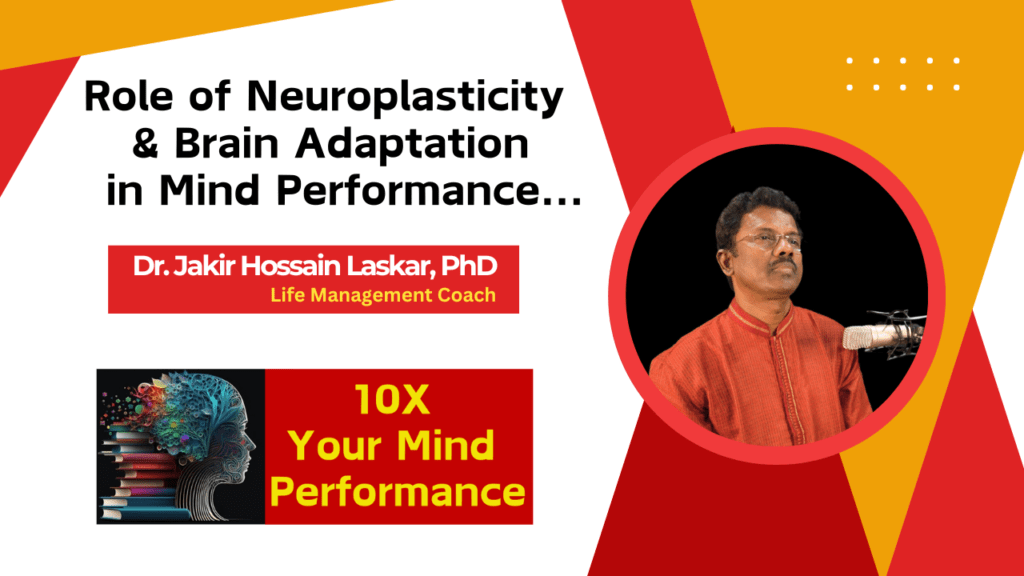Dr. Jakir Hossain Laskar, PhD
Improving Your Intuition Skill: Practice Using Emerging Principles Of Mind Performance
Our sixth sense is often called an intuitive sense, and it is a highly powerful skill that makes it possible to know or comprehend things far beyond the processing capabilities of our conscious mind. It’s that intuitive feeling, feeling or straightforward idea that helps us in determining something or even advising us toward a certain direction or away from it. Many people believe that this skill is a God-given skill. However, just like any other skill, it can also be developed. This particular piece will discuss different and yet effective ways to train your sixth sense allowing you to make quality decisions and open the way for more brain sharpness.
How To Characterize The Sixth Sense?
Intuition is your unconscious mind’s ability to rapidly analyze and synthesize data which gives out detailed instructions rather than facts. On the other hand, the five senses; sight, hearing, touch, taste and smell, intuition operates in a whisper and utilizes previous occurrences as well as stimuli that had been absorbed unconsciously by the brain to aid in the decision making process.
Common Signs of Intuition
(1) A feeling that tells you that something is either right or wrong.
(2) A thought or solution to a problem that has seemingly just popped into your head.
(3) The ability to understand a person’s mood without them saying anything.
(4) The feeling one receives from a certain situation where everything doesn’t logically feel correct or being overly comfortable.
The Science Behind Intuition
Contrary to the general view, intuition is an inherent ability of the brain that makes use of its amygdala and the prefrontal cortex. The amygdala interprets minute nuances from the surroundings while the prefrontal cortex of the brain recollects past experience and offers insights or warnings.
Why Intuition Matters
Intuition is a critical asset to entrepreneurs, athletes, and leaders as they are able to tap in to their intuitive decision making abilities in order to make crucial decisions. The combination of intuition and sweat equity accelerates the innovation of an individual. With the sixth sense, you can:
Increase the confidence and speed at which you make decisions.
Become more self-aware and perceptive.
Tap into your creative and critical thinking capabilities.
7 Practical Ways to Enhance Your Sixth Sense
- Practice Mindfulness
Mindfulness serves as the core anchor from which intuition is founded. Trying to be in the present alone could improve an individual’s ability to sense minute signals that they are not normally able to detect.
Exercise: Try to allocate five minutes every day to focus on breathing or looking around without offering any judgment.
Benefit: Decreases brain fog, which facilitates the detection of intuitive cues.
- Keep an Intuition Journal
For you to cherish the times you followed your gut feeling such as these, journaling is ideal for pinpointing and following along your intuitive moments.
Exercise: Keep a record of instances where you experienced a gut feeling to the way it all worked out. After some time, you will begin to see reoccurring themes on how the intuition manifests.
Benefit: Increases confidence in the ability to follow one’s instincts.
- Be Aware Of What Your Body Is Trying To Communicate
Intuition frequently manifests in bodily sensations as well.
Exercise: Whenever you are faced with a choice, take a moment to assess the reaction from different parts of your body. For instance, a heaviness in the chest could mean ‘no,’ while a light feeling could mean ‘yes’.
Benefit: Bridging the body and the mind in a better way.
- Enhance Your Ability To Detect
Eagle-eyed observation advances the ability of your sub-consciousness to recognize patterns to an elite level.
Exercise: Go to a public place and sit quietly for 5 minutes observing other body movement, facial expressions, gestures and tone of voice.
Benefit: Increases the sensitivity of the ‘seeing’ part of ‘hearing’ to faint signals.
- Think Deeply About Situations When You Used Your Instincts In The Past
A smooth sail of triumph and success in certain areas based on feeling alone serves as testimony to self-belief.
Exercise: Imagine this scene and try to capture the moment when all your feelings and thoughts were right, when your instincts have done well. Feel the moment over and over again.
Benefit: Allows a ‘flexing of the muscles’ type of moment on how to identify signals of intuition.
- Try Artistic Activities
There is intuition also involved in these matters, that is primarily hidden in subconscious and this can be unleashed through creativity.
Exercise: Try engaging in free writing, scribbling, and brainstorming for 10 minutes every day, no pressure and no rules, its just an activity not a chore.
Benefit: Facilitates intuitive thinking by bringing out insights that lie dormant in the inner recesses of the mind.
- Begin with Minor Decisions
Making small intuitive choices enables one to develop confidence in their instinct and move with ease.
Exercise: Each day, pick a single decision that considers just your feeling, including deciding which path to take to go to work or what new things to do.
Benefit: This helps improve trust in one’s feelings.
Excessive Inner Commentary: Activities Which Hinder Effective Use of Intuition
Everybody has intuition, but there are such habits, which prevent intuition from functioning Marianne Williamson Quote.
Common Challenges:
Overthinking: Intuitive subtlety can be easily over taken by logical analysis of the situation.
Self-Doubt: Self questioning of your instincts diminishes their potency.
Mental Noise: Intuitive voices are drowned by busy mental chatter.
Solutions:
Learn to practice mindfulness to clear your head.
Expand towards bigger and bigger decisions so that one regains trust in their instincts.
Eliminate key distractions in order to create quietness in the minds of people at critical points.
Testing and Strengthening Your Intuition
Fun Exercises to Try:
Card Guessing Game: Get a pack of cards then before turning each card over, guess the color or suit of the card.
First Impression Test: Try to gauze the energy or mood of another person before interaction and check your prediction later.
Yes/No Decision Practice: Ask yourself a question that can be solved by a simple “yes” or “no”, and begin with closing your eyes and concentrating on how long said feeling is to manifest.
The Long Term Effects of Such Training in Intuition
Regular training of one’s intuition could have the following outcomes:
Develop a stronger self-belief in your instincts.
Conclusion: Why it is important to trust your instincts
Your intuition is more than just an esoteric concept, it can be regarded as a theory that emerges naturally and can be honed as any other ability. Most individuals perform other personal habit-building activities such as meditation and daily reflection activities. They make our minds stronger and more robust, and in turn, the general enterprise of decision-making is made easier.
Call to Action: Start with something quite simple. Identify an approach discussed in this blog and implement it at least once daily for one week. Write how your intuitive abilities have developed right in the comments section below. Do not hesitate to recommend this guide to anyone who wishes to learn to tap into their intuition because it helped you!


